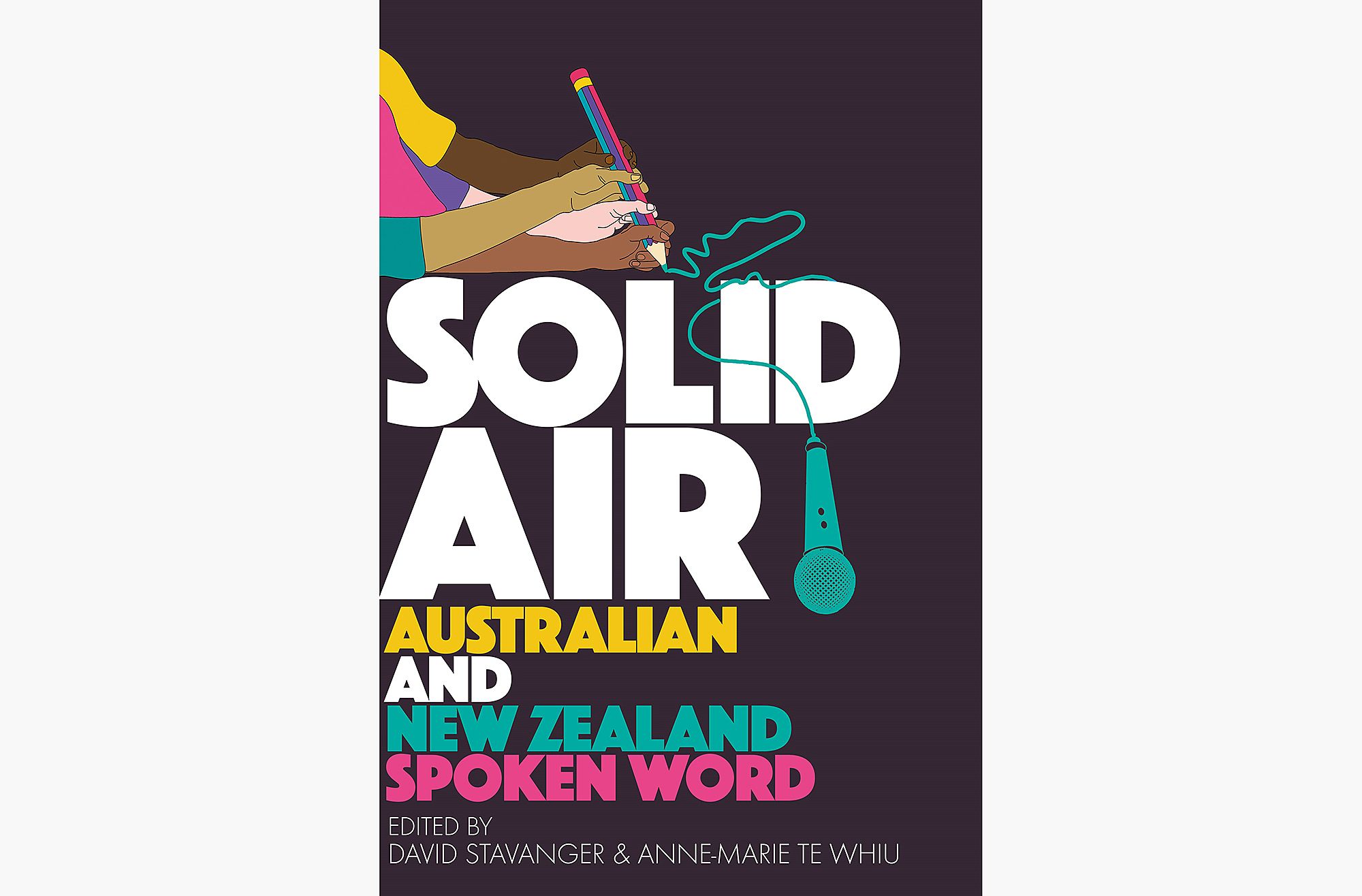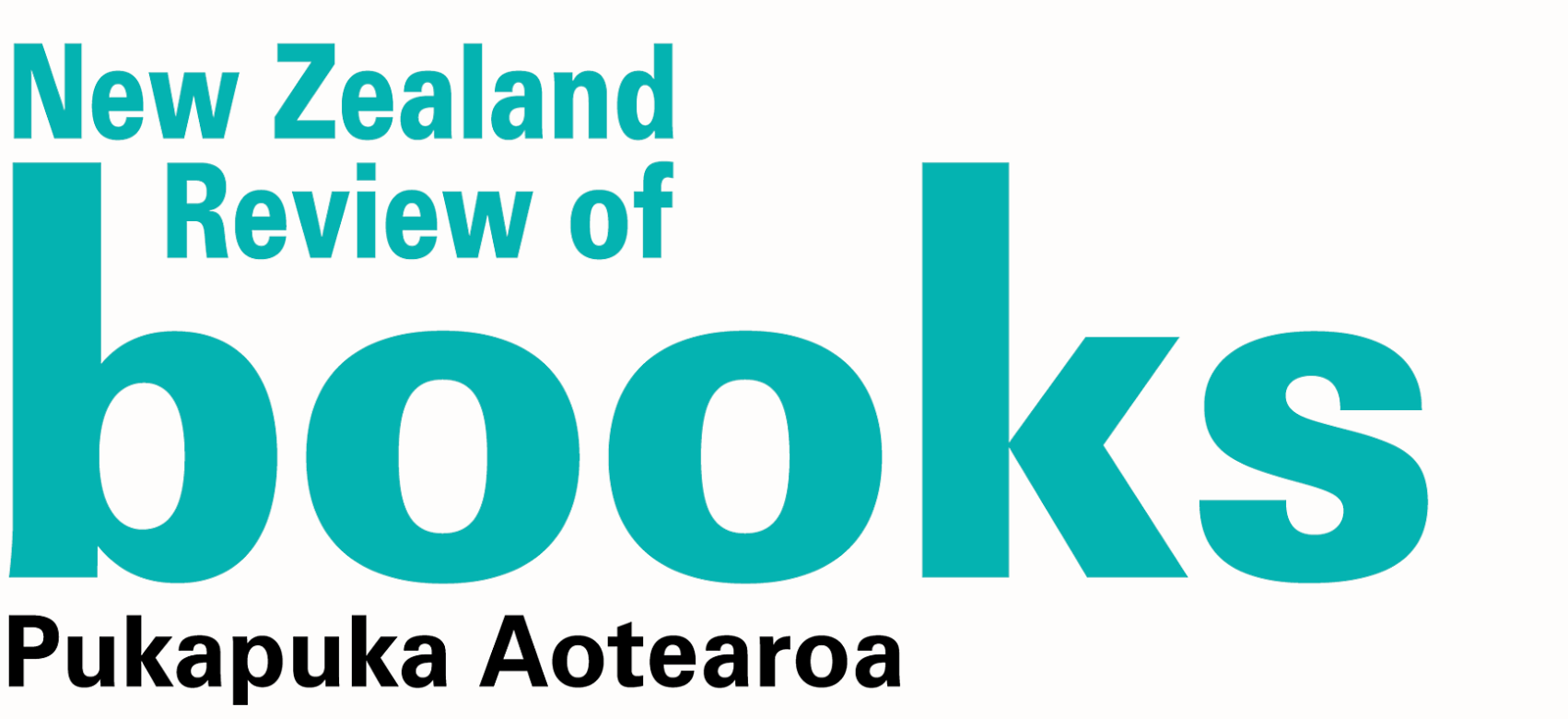Leave Behind the Desire to Ask, “But Is This Poetry?”
Veteran of Auckland’s spoken word scene Tim Heath reviews the recent Trans-Tasman anthology Solid Air: Australian and New Zealand Spoken Word.
How can a book ever capture the live spirit of spoken word? Veteran of Auckland’s spoken word scene Tim Heath reviews the recent Trans-Tasman anthology Solid Air: Australian and New Zealand Spoken Word. Edited by David Stavanger and Anne-Marie Te Whiu, it includes work by Taika Waititi, Tayi Tibble, Hera Lindsay Bird, Behrouz Boochani, Selina Tusitala Marsh and many others.
Several years ago, I spent 10 months living in a small town in rural northwest Tasmania. As you do, I joined the local poetry group. It was an assortment of up to 12 poets, who met on Sunday afternoons in a deserted coffee-shop, under the leadership of a local self-appointed literary giant, much mocked by the others, none of whom wanted to mount a takeover coup. The first time I read some of my work, I was greeted with a long silence that was interrupted by Pete, a dedicated bush poet and retired handy man, who folded his thick arms, shook his head and said: “If it ain’t rhyming iambic pentamp, mate, then it’s just a bloody cop out.”
They were hospitable, generous folk whose company and writing I came to enjoy. Pete and I had many beers together and became honest, but ineffectual, critics of each other’s work.
Ever since then, whenever I have been asked to comment on poetry, I have thought of Pete and his total commitment to ababcdcd and teedum teedum. He would not have liked Solid Air, would probably have only thumbed through looking at the end of lines in the hope of finding a “real poem”. He would have had his hopes raised by Tug Dumbly’s “My Country” and Max Ryan’s “Old Guys”, but would have tossed the book away with a comment like: “It’s all bullbloodyshit same as the kiwi stuff you try to get away with and it’s your turn to buy the bloody beer.”
So is Solid Air, itself another trans-Tasman collaboration, deserving of the judgement I imagine Pete would have bestowed upon it? Emphatically not, although it has taken me a lot of reading and thinking to say so this strongly. It has not been an easy read, from the jolting design of the front cover to the huge variations, and levels of skill, displayed by its 118 poets. I think I am accustomed to reading poetry selected around a theme or collections of poems by one poet, both of which allow me to trace developments, to luxuriate in the same waters. Solid Air, however, took me from a warm bath straight to a cold shower and back again many times, which both invigorated and wearied.
If I have interpreted the authors’ introduction correctly, they see Spoken Word as a movement, a breakaway from tradition and all that would have gained Tasmanian Pete’s approval. They speak of a multi-roomed house in which anyone can find a space. Alison Whittaker in her foreword says: “Solid Air is an important and timely anthology that brings together the excellence, passion and compassion of a wide variety of voices with a transformative vision for what poetry is and does ….”
Implicit in this quotation, and much of the foreword, is the suggestion that the collection is presenting something new, “not thinking of poetry as a museum”, something that readers and poetry lovers may find radical and challenging. This could be considered one of the book’s greatest values, and it may well be that it would have been better to have it reviewed by, not perhaps Pete, but someone for whom the freedom, openness, anger and honesty of much of spoken word poetry is a new experience.
At its worst, this poetry is of the “what happened to me was worse than what happened to you” genre. At its best, it is so deeply moving and unflinchingly honest that it transcends any thoughts of “poetic skill”, whatever that might be.
It is not new territory for me. I have hung around Auckland’s Poetry Live for more than a decade. Poetry Live is a weekly pub-based performance poetry evening that has, remarkably, lurched along, without a break, for 38 years. It brings together a startling collection of poets – the good, the bad, the mad, the sad. There are those for whom it is a weekly poetry fix, and those who only come for one wide-eyed evening. It is accepting, compassionate, generous, only judgemental of hate speech and misogyny. Much of the work performed is from emerging poets who have encountered poetry (for the first time since an off-putting school experience) at a youth or mental health support group. At its worst, this poetry is of the “what happened to me was worse than what happened to you” genre. At its best, it is so deeply moving and unflinchingly honest that it transcends any thoughts of “poetic skill”, whatever that might be. It can be unceremoniously honest about love, desire, sexual preference, abuse, cruelty given and received, politics, racism and going to school without lunch. It is often loaded with stunning revelation.
Solid Air will be enthralling for someone entering the world of modern spoken word for the first time. They will need to have a more open mind than Tasmanian Pete and be prepared to hear rather than analyse. They will need, as much as possible, to leave behind the critical skills and the desire to ask, “but is this poetry?”
Reading Solid Air made me think of that odd phenomenon of competitive poetry the poetry slam. Slams are wild, exciting, ribald and, apart from a few token old folk, the domain of new young poets with burning messages, experience of cultures other than the mainstream and skills in audience enthralment. They shout and whisper, rap and rant, swear and sing. They make spoken word a living, hissing and spitting thing, full of tension, loaded with grief, outrage and delight, filling audiences with an excitement that seldom leaps out in the same way from the black-and-white printed page.
If a poetry slam was a meal it would include pasta, palusami, chillies, hamburgers, chips, kosher dill pickles, Vindaloo curries, salami, grapes sour and sweet, falafels and vegan feasts. There may not be plates of well-organised cucumber sandwiches.
I cannot get away from a belief that poetry, if nothing else, is the product of hard work. I confess I am judgemental about young poets at Poetry Live who happily stand at the microphone and say, “I just wrote this on the bus on the way here” or worse still “I just wrote this a few minutes ago, between my third and fourth beer.”
This is a spoken word world I know and love. It is the world David Stavanger and Anne-Marie Te Whiu have endeavoured to capture and present in Solid Air. It is a great collection and one that will be enthralling for someone entering the world of modern spoken word for the first time. They will need to have a more open mind than Tasmanian Pete and be prepared to hear rather than analyse. They will need, as much as possible, to leave behind the critical skills and the desire to ask, “but is this poetry?” I cannot, for example, get away from a belief that poetry, if nothing else, is the product of hard work. I confess I am judgemental about young poets at Poetry Live who happily stand at the microphone and say, “I just wrote this on the bus on the way here” or worse still “I just wrote this a few minutes ago, between my third and fourth beer.”
I further confess, if they then read the poem from their cellphones, my discomfort grows – I am old enough to want poetry on paper, preferably parchment, with an illuminated script. I want a poet’s first ecstatic beholding of a newly written poem to be savoured. We all need, and should be allowed, our “God isn’t this so brilliant” moments, providing they are followed, hopefully after a time of creative euphoria, a sober revision that should involve, at the very least, the culling of significant percentage of the words. As I read through Solid Air, I wanted to cull at least 5% of the words from most poems, wanted them tighter, leaner and more fighting fit. It is probably true that traditional structures demand this kind of discipline – you can’t write a villanelle, if it is carrying hitchhikers and freeloaders. I don’t want to inhibit the excitement of Spoken Word writers with demands for the discipline of Shakespeare, but I do want ramble and tautology reined in. I don’t want a poem to be able to be written as prose and not be changed by the experience.
I have one major frustration with Solid Air, a frustration that may be unfair, but has to be voiced. I wanted to hear the poems. I wanted a spoken word collection to be spoken.
I do have quibbles, but, as I read, I marked the poems I liked with coloured stickers. Halfway through I gave up doing this because I was marking most of them. Despite all that I liked and admired, despite the forest of stickers hanging out of the book, I have one major frustration with Solid Air, a frustration that may be unfair, but has to be voiced. I wanted to hear the poems. I wanted a spoken word collection to be spoken: I wanted to be able to listen the poets. I read many poems aloud to myself, trying to find the poets’ voices. I relished the work of poets I know, because I knew how they sounded, how they would have spoken to me.
Clearly the logistics of assembling an anthology like this are huge and to demand the inclusion of the voices of the poets would have added immeasurably to the task. However, has there ever been an age when collecting recorded voices has been easier? I think of websites like Poetry Archive, which I looked at every day until it started charging 89p per poem. More local, accessible and free is Michele Leggot’s wonderful Six Pack. I lament that Stavenger and Te Whiu had not been able to take this extra step. The kaleidoscope of voices that would have arisen from Solid Air would have added so much to my enjoyment, might have even persuaded Tasmanian Pete to listen for a while.
So how can I sum up the happy roller coaster experience of reading this exciting and important collection? Perhaps by saying I loved the book, but can’t wait for the movie.
Solid Air is published by University of Queensland Press (August 2019)
This piece is presented in an editorial partnership with
New Zealand Review of Books Pukapuka Aotearoa.


